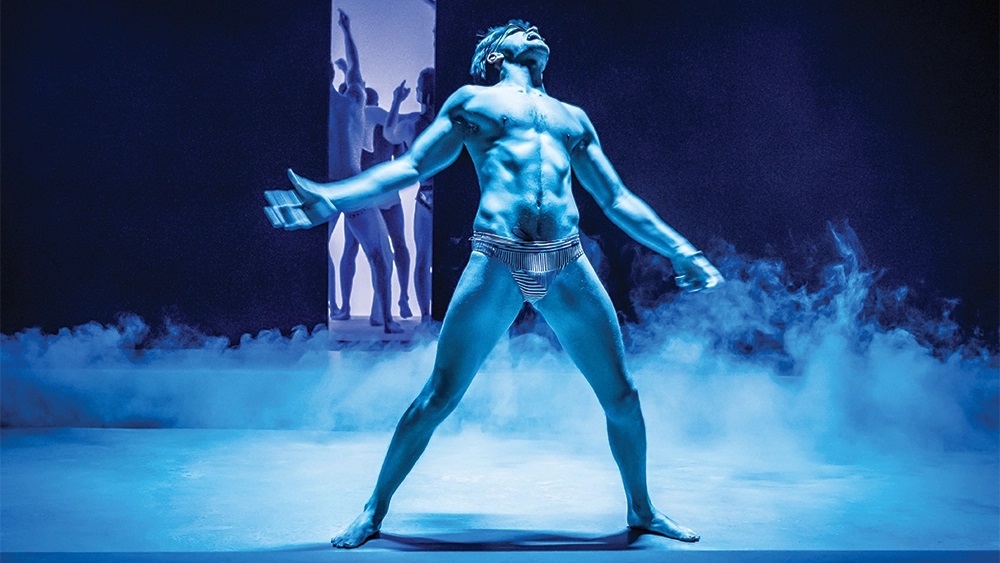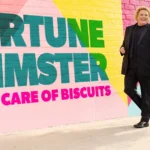I had been curious to see “The Inheritance” ever since it became the much talked about Tony winning play of 2020 which opened on Broadway in 2019 after a celebrated run on London’s West End. The play was notable as much for its 6-hour plus running time as it was for offering a fresh take on the modern gay experience, bridging the trauma of our collective past to the strides made along the way to our fraught present. Whatever criticism (or praise) this ambitious opus generated, it is worth noting that playwright Matthew López holds the distinction of being the first Latiné (the playwright’s preferred variant of Latin-x) individual to win the Tony for Best Original Play. In his acceptance speech at the Tony’s, Lopez made an impassioned plea for greater Latiné representation thanking three queer men who paved the way for him: E.M. Forster, Terrence McNally and Miguel Piñero, the first Puerto Rican playwright to be produced on Broadway.
In his play, López conjures British author E.M. Forster (1879-1970) in the character of Walter (played with genteel elegance by Bill Brochtrup). Forster’s Edwardian novel “Howards End” (published in 1910 and adapted into a stately Merchant Ivory film in 1992) had a profound impact on López. Despite the film’s absence of any overtly queer themes or characters, the film nevertheless spoke to López’s emerging identity as a queer man. As López explained to the Los Angeles Times in 2019, “I wanted to queer it [Forster’s novel] and write something that Forster himself might have wanted to write, had he been allowed to.” Much like other seminal gay works including “Angels in America,” “Longtime Companion,” “Philadelphia” and “The Boys in the Band,” “The Inheritance” takes on weighty issues within the gay community and grapples with the specter of AIDS and its lasting impact on our community.
Set in contemporary New York following Trump’s electoral victory and the aftershocks that reverberated, the play’s central focus is on the relationship between two men in their mid-thirties, happily ensconced in a rent-controlled apartment on New York’s Upper West Side. Eric Glass (played with an earnest charm by Adam Kantor) and his more mercurial playwright boyfriend Toby Darling (played by Juan Castano) seem well-matched on the surface and after 7 years are ready to make it official. But Toby pulls the plug on their wedding plans when he gets a taste of fame as his play is headed for Broadway and accuses Eric of “entrapment” after learning he withheld news that they are being evicted from Eric’s rent-controlled apartment. Thrown into the mix is a fetching young actor named Adam who is ten years their junior and gets cast in Toby’s play.
All the while, there is a parallel story which focuses on the relationship between an older couple featuring Walter (aka E.M. Forster) and billionaire Henry Wilcox which becomes a point of comparison with Eric and Toby’s relationship highlighting the obstacles faced by an earlier generation. Eric forms a strong bond with Walter which informs him of the evolution his character will make in the years to come. When Walter dies, Eric forms a relationship with his billionaire widow Henry who happens to be a Republican, much to the consternation of Eric’s liberal friends. While engaging and well-executed for the most part, “The Inheritance” strains under the weight of overwrought plot contrivances and verges on melodrama. Nevertheless, the play delivers some memorable poignant moments, particularly at the end of part one as Eric experiences an otherworldly encounter with the ghosts of AIDS victims.
Castano and Kantor (as Toby and Eric) acquitted themselves admirably, especially considering the many emotional twists and turns their characters experience on their respective journeys. As López described to the Los Angeles Times in 2019, “I put all my worst qualities into Toby, and I put all my best qualities into Eric. I have taken the two sides of myself and allowed them to do battle royal for six and a half hours onstage.” While the entire ensemble was uniformly effective, there were several standouts including Bradley James Tejeda who played the dual roles of Adam and his doppelgänger Leo who exist at opposite ends of the socio-economic spectrum.
Tuc Watkins, familiar to TV and film audiences from roles in “Desperate Housewives” and “The Boys in the Band,” helped ground the play with his unapologetic portrayal of a character whose extreme wealth is intricately connected to the oppression of the economically disadvantaged. Watkins masterfully conveyed the textures of a character who seems emotionally disconnected at times yet exhibits flashes of anger and glimpses of tenderness which suggest otherwise. Finally, Tantoo Cardinal gives a riveting performance as an Indigenous mother whose inability to accept her son’s sexual orientation while he is alive finds a way to transform her grief by helping other men dying of AIDS.
Now to the sizeable elephant in the room: the play’s length which at 6 hours and 35 minutes is… let’s be honest… a commitment. Which begs the question: how long is too long? One might ask: is that a fair criticism? Or is it like accusing Shakespeare of being too wordy or like the Emperor in Amadeus who berates Mozart’s compositions for having too many notes. Even the playwright (López) makes several references (through the characters) to over-long manuscripts which generated some of the biggest laughs because the audience was thinking the same thing. López broke William Faulkner’s cardinal rule who famously said a writer must be willing to “kill his darlings” for the sake of the big picture.
So, is “The Inheritance” a masterpiece of gay theatre or is it an over-hyped derivative slog as some critics have suggested? I would argue that it is neither of these extremes, but somewhere in between depending on one’s theatrical taste and sensibilities. In the final analysis, it is an ambitious undertaking that earned its plaudits and while it isn’t perfect, its strengths outweigh whatever shortcomings exist. While sitting through a 2-part marathon like “The Inheritance” may feel a bit like eating your Brussels sprouts because you know it is supposed to be good for you, there is an intrinsic value to sharing our stories writ large in a communal way. “The Inheritance,” whatever its imperfections, explores a part of our history which warrants unpacking, even if that means indulging an at-times over-indulgent piece of work.
Now through 11/21 at the Geffen Playhouse.
Last modified: October 31, 2022

















